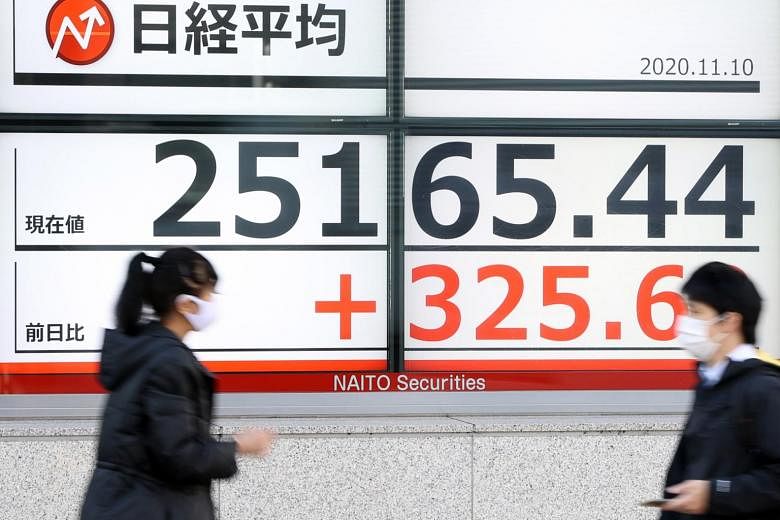SYDNEY (REUTERS) - Asia's stock markets opened higher on Monday (Nov 16), as vaccine optimism offset worries about rising coronavirus cases in Europe and new lockdowns in the United States, while oil prices and risk-exposed currencies also edged higher.
Japan's Nikkei surged 1.6 per cent crossing a 29-year peak. Australia's ASX 200 rose 1.2 per cent to an eight-month high while South Korea's Kospi index gained 1.6 per cent..
Singapore's Straits Times Index was up 1.2 per cent at 9.36am local time.
S&P 500 futures rose 0.7 per cent following the index's record closing high on Friday and futures pointed to positive a positive start to the week in Hong Kong.
The US dollar, meanwhile, was marginally lower against the Antipodean currencies. Oil prices crept higher, though not enough to recoup late-week losses on worries about the winter ahead.
Traders are expecting more good vaccine news as soon as this week from drugmaker Moderna, following the successful trial of Pfizer's similar drug - and that seems enough to assuage nearer-term concerns about the virus' economic harm.
"There's just mountains of cash sitting on the sidelines, waiting to be put to work and since we've got this vaccine news, as well as diminished risk around the US elections, all of this is flying into equities," said Kyle Rodda, analyst at IG Markets. "Everyone's thinking now that it's the cue to get in."
President Donald Trump appeared on Sunday to acknowledge losing the US election but then backtracked and said he concedes "nothing," while President-elect Joe Biden focused on tackling the coronavirus pandemic.
In North Asia, Japan's quarterly economic growth beat expectations while China's factory output and retail trade data is due later in the day.
Fifteen Asia-Pacific economies, including China and Japan but excluding the United States agreed to a trade deal over the weekend which, although light on detail or immediate tariff cuts, is a landmark pact for East Asian exporters.
"(The) agreement ... signals that Asia keeps pushing ahead with trade liberalisation even as other regions have become more sceptical," said HSBC economists Frederic Neumann and Shanella Rajanayagam in a note.
"As such, it may reinforce a trend that's been already underway for decades: that the global centre of economic gravity keeps pushing relentlessly to the East."
Brexit crunch looms, again
In currency markets, majors were mostly flat apart from sterling, which made a nervous start to a week that looms large for Brexit trade talks, slipping a tad against the euro and the dollar to last hold at US$1.3180.
The departure of hardline adviser Dominic Cummings from Downing Street last week may leave more room for British compromises, but chief negotiator David Frost said on Twitter that talks "may not succeed".
Negotiations have already missed several deadlines and the next one looms with Thursday's European Union summit.
The euro brushed a one-week high of US$1.1845 in early Asia trade and the yen sat at 104.66 per dollar.
The risk-sensitive Australian dollar bought US$0.7284 and was steady ahead of a week of central bank speeches and significant data, beginning with Reserve Bank of Australia Governor Philip Lowe at 0840 GMT.
A slew of US Federal Reserve speakers are also up this week, beginning with Vice Chair Richard Clarida at 1900 GMT.
Bonds, which had sold off strongly on vaccine news last week, pared some losses into Friday's New York close to leave the yield on benchmark US 10-year debt at 0.8930 per cent, from a week high above 0.97 per cent.
Oil prices inched higher, with Brent crude futures up 0.4 per cent to US$42.94 a barrel but below last week's two-month high of US$45.30. US crude rose 0.6 per cent to US$40.37 a barrel.
Gold held steady at US$1,890 an ounce

